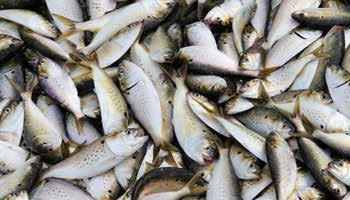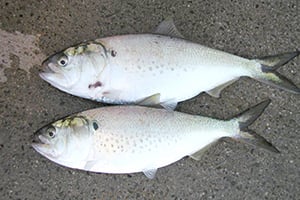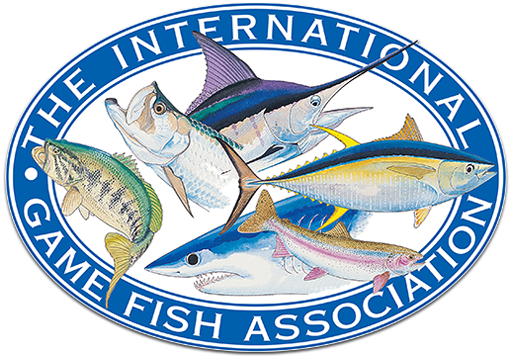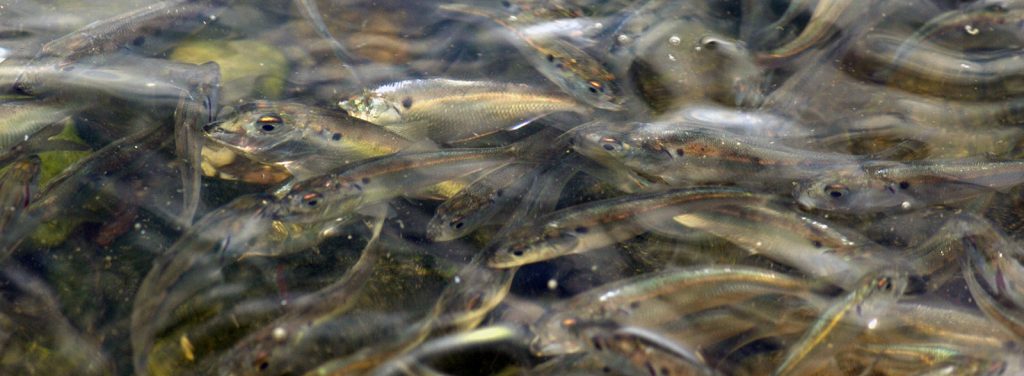Fisheries Managers Fail to Protect Menhaden and Striped Bass
 The Atlantic States Marine Fisheries Commission has voted to allow an Atlantic menhaden catch that will not leave enough menhaden in the water for striped bass.
The Atlantic States Marine Fisheries Commission has voted to allow an Atlantic menhaden catch that will not leave enough menhaden in the water for striped bass.
Catch was set at 186,000 MT, when scientists said that a quota of 108,000 MT was necessary to have a 50% chance of success of rebuilding the striped bass fishery. The move came after the ASFMC acknowledged that faulty science led to a substantial overestimation of menhaden stock size in the past.
Representatives from the recreational fishing community objected at the meeting, even as they were surrounded by attorneys from the Virginia menhaden reduction industry, which bussed in workers to protest the changes.
“Menhaden fishing for reduction should be prohibited,” said International Game Fish Association President Jason Schratwieser. “Removing menhaden from the ecosystem and rendering it into animal feed or other industrial products - most of which is exported - is a poor use of this vital resource. Menhaden are many times more valuable to local and the national economies when used as bait for commercial lobster and crab fisheries, or when left in the water to support other important recreational and commercial fisheries.”
“The Commission’s move is beyond disappointing,” said Ted Venker, Director of Conservation for Coastal Conservation Association. “Yes, the quota is being reduced, but not nearly enough and not nearly fast enough. We’ve been overharvesting the base of the Atlantic food chain for years with
 devastating consequences, for everything from striped bass to ospreys and that’s going to continue.” "It’s inconceivable that the Virginia delegation voted against more aggressive menhaden cuts and improved Chesapeake Bay management, both of which could help our ailing striped bass fishery. It appears they’ve chosen to ignore the ecosystem science," said Steve Atkinson, Virginia Saltwater Sportfishing Association.
devastating consequences, for everything from striped bass to ospreys and that’s going to continue.” "It’s inconceivable that the Virginia delegation voted against more aggressive menhaden cuts and improved Chesapeake Bay management, both of which could help our ailing striped bass fishery. It appears they’ve chosen to ignore the ecosystem science," said Steve Atkinson, Virginia Saltwater Sportfishing Association.
“Menhaden are THE foundational forage fish species. The ASMFC recognized that when they adopted an ecosystem-based management approach for the species that not only considers harvest impacts but also the needs of the natural system, including tarpon,” said Jim McDuffie, President and CEO of Bonefish and Tarpon Trust. “While today’s vote resulted in a 20% reduction, it was far short of the reduction recommended by the Commission’s own scientists. BTT urges the Commission to look at further reductions of the menhaden quota, the reallocation of quota between states to minimize quota impacts to the bait industry, and addressing the Chesapeake Bay cap concurrently.”
Seventy percent of the menhaden catch along the Atlantic goes to the “reduction” fishery, which grinds the fish into meal for salmon aquaculture and pet food. Reduction fishing has been banned in every Atlantic state except Virginia, where a single plant still operates. That plant is owned by Canadian industrial fishing giant Cooke Seafood.
Media Contact: Blake Gober; [email protected]

